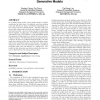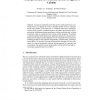759 search results - page 127 / 152 » On formal models for social verification |
KDD
2010
ACM
14 years 9 months ago
2010
ACM
In an online rating system, raters assign ratings to objects contributed by other users. In addition, raters can develop trust and distrust on object contributors depending on a f...
CMOT
1998
14 years 11 months ago
1998
A programming language which is optimized for modelling multi-agent interaction within articulated social structures such as organizations is described with several examples of it...
108
click to vote
TMM
2010
14 years 6 months ago
2010
Abstract--The automatic discovery of group conversational behavior is a relevant problem in social computing. In this paper, we present an approach to address this problem by defin...
100
click to vote
KESAMSTA
2010
Springer
14 years 10 months ago
2010
Springer
A variety of business interactions in open environments can be captured in terms of creation and manipulation of social commitments among the agents. Such interactions include B2B ...
100
click to vote
CANS
2009
Springer
15 years 6 months ago
2009
Springer
Abstract. Anonymous credentials are widely used to certify properties of a credential owner or to support the owner to demand valuable services, while hiding the user’s identity ...


